Generative AI’s success in passing the Turing Test is a watershed moment in technological advancement. Its versatility in mimicking human intelligence opens doors to countless possibilities, from revolutionizing content creation to optimizing complex processes. The question is no longer if AI will change the game, but how.
In this extensive guide, we’re pulling back the curtain on 65 powerful Generative AI use cases across 18 industries, offering a glimpse into the vast capabilities of this technology. Whether you’re looking to boost customer experiences, streamline operations, or simply keep up with the latest advancements, these real-world examples will show you how such systems can be your secret weapon for success.
Moreover, as a leading Generative AI development company, we’re here to help you every step of the way, starting with identifying the perfect scenario for your business. So buckle up and get ready to discover how GAI can give your brand a much-needed upgrade.
Table of Contents
The Tangible Benefits of Generative AI Use Cases
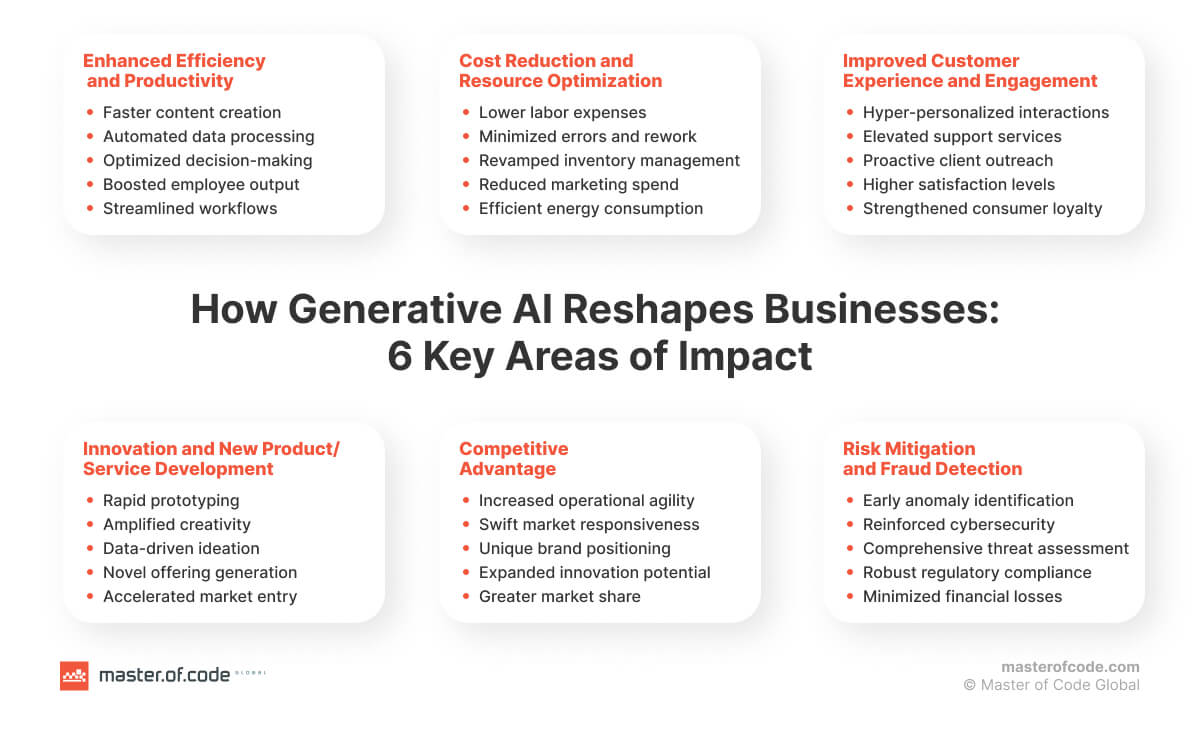
Machine intelligence isn’t merely a trend; it’s a powerful tool that can fundamentally reshape your business operations. Our experience as a Generative AI consulting company has shown that its implementation unlocks a wealth of opportunities for growth and productivity. We’ll take a closer look at some of these advantages to see why you should consider investing in intelligentization.
- Operational streamlining. Adaptive algorithms automate routine tasks across departments, from accounting to supply chain management. This transformation enables staff to concentrate on intricate problem-solving and long-term planning, markedly enhancing organizational efficiency.
- Personalized customer engagement. Smart systems examine consumer habits to deliver bespoke experiences. Customization influences product innovation and service provision, aligning offerings more precisely with individual preferences. For personalized engagement at scale, Master of Code Global built a GenAI assistant that routed members to relevant answers instantly—driving 1.5M+ interactions and a 25% increase in webchats for a global professional hub.
- Resource optimization. Intelligent software refines processes and forecasts material requirements with remarkable precision. As a result, firms distribute funds more judiciously and minimize waste, resulting in significant expense reductions and improved eco-friendly practices.
- Enhanced client relations. Enterprises utilize AI to offer continuous assistance and proactively address buyer concerns. Such a forward-thinking approach cultivates allegiance and boosts customer lifetime value by anticipating needs preemptively.
- Scalable production. Advanced technologies facilitate swift prototyping and adaptable manufacturing techniques. Eventually, companies are able to quickly adjust output based on market fluctuations, lowering inventory expenses and improving responsiveness.
- Competitive edge. AI-enabled trend examination helps corporations stay ahead of sector shifts. By recognizing emerging patterns, businesses can spearhead groundbreaking products and services, establishing themselves as industry pioneers.
- Data-driven decision making. Machine learning models analyze vast information sets to uncover hidden correlations. These insights guide strategic roadmap creation, risk evaluation, and investment choices, fostering robust business strategies.
- Risk mitigation. Predictive AI solutions assess global trends and internal metrics to forecast potential disruptions. With this, organizations are capable of crafting contingency plans and adapting to evolving conditions, ensuring lasting resilience.
While the pros of the technology are undeniable, its true power lies in its versatility. Let’s now discuss some of the top applications being adopted across various industries.
Cross-Sector Generative AI Use Cases
Cost-Effective Product Development
Research indicates Generative AI could deliver R&D expense savings of 10-15%, with global adoption in product development expected to double by 2026, reaching 46%. Intelligent algorithms optimize item features, automate repetitive tasks, and accelerate manufacturing cycles, leading to faster time-to-market. AI-powered analysis of customer data enables the creation of products precisely tailored to consumer preferences. Moreover, analyzing buyer feedback pinpoints areas for enhancement, increasing the likelihood of higher ROI.
Intelligent Code Generation
Imagine automating 20-45% of your software engineering functions. That’s the potential impact of generative applications in the field. By employing AI to write, correct, and refactor code, developers can focus on higher-level tasks like system design and architecture. This not only accelerates the process but also improves quality, enabling teams to build more complex and sophisticated solutions.
Data-Driven Sales Assistance
Generative technology also excels at redefining the sales landscape. It automates tedious tasks like data entry and CRM updates, freeing salespeople to focus on relationship building and closing deals. More importantly, it analyzes consumer behavior to hyper-personalize interactions. This means tailored recommendations, targeted email campaigns, and even predictive lead scoring. The result is a measurable impact: 84% of users report increased sales, and 90% experience faster customer service.
Hyper-Customization at Scale
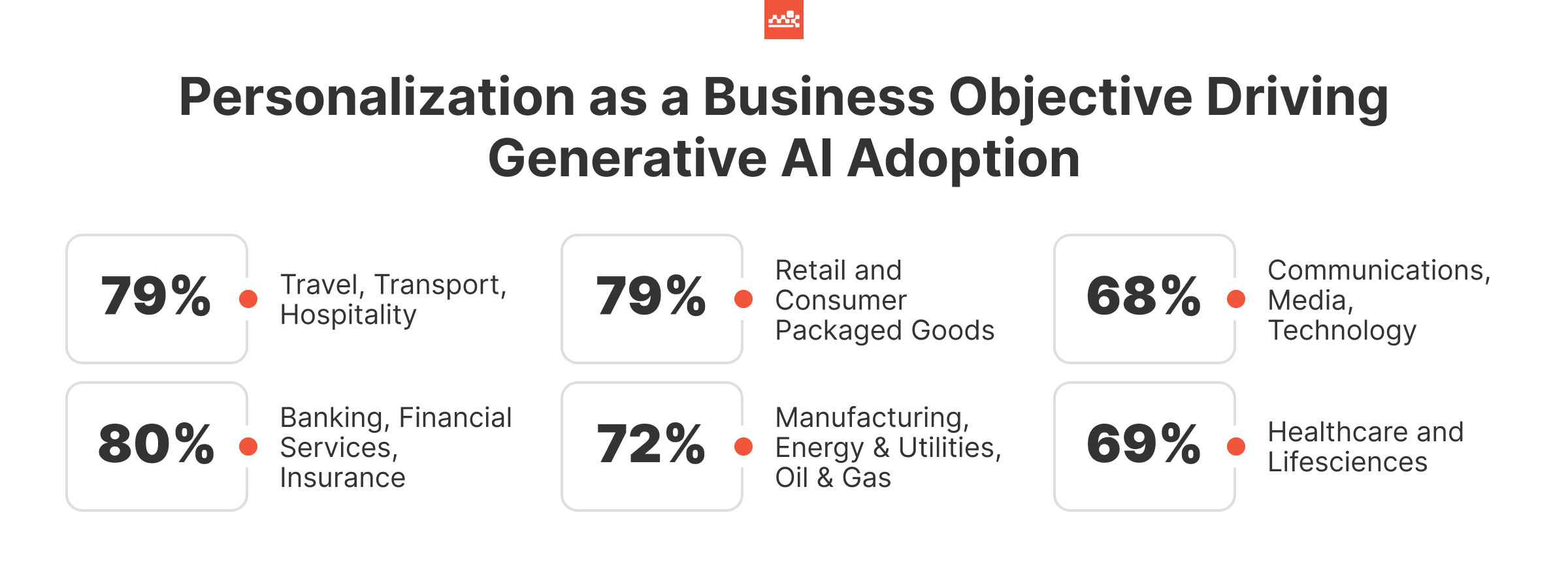
Personalization is no longer a luxury; it’s an expectation. In fact, 47% of consumers value tailored deals and 42% seek bespoke product recommendations. Generative applications meet this demand by analyzing shopper data to create unique experiences across various touchpoints. Whether it’s a chatbot offering individualized support or a website dynamically adjusting content, intelligentization ensures each interaction is relevant and engaging. This approach not only improves satisfaction rates but also boosts brand loyalty and drives business growth.
Customer Support Assistance
Generative AI is the ultimate co-pilot for consumer service representatives. No wonder, Gartner predicts that 50% of client care organizations will deploy these virtual assistants by 2026. Machine intelligence analyzes interactions, extracting valuable insights from conversations and feedback. This data fuels personalized suggestions, targeted messaging, and proactive issue resolution. Additionally, AI-driven knowledge bases and FAQ automation tools equip agents with the information they need to deliver exceptional help.
Supercharging Marketing Strategies
Capgemini reports that 48% of executives see artificial intelligence as a driving force in marketing and communications. It’s no wonder, considering the wide-ranging applications. Smart systems can craft compelling ad copy, personalize email campaigns, and even generate targeted content for specific consumer segments, leading to higher engagement and improved conversion rates.
By analyzing buyer behavior, the technology can predict churn, recover abandoned carts, and ultimately deliver a stronger ROI. Moreover, generative systems are invaluable for lead generation, enabling businesses to identify high-potential prospects, automate outreach, and nurture leads with personalized materials, ensuring a seamless customer journey.
Do you want to achieve the projected 20% ROI that other companies are experiencing by investing in AI? Read our guide and choose Generative AI use case to boost your business growth
Adaptive Fraud Detection and Prevention
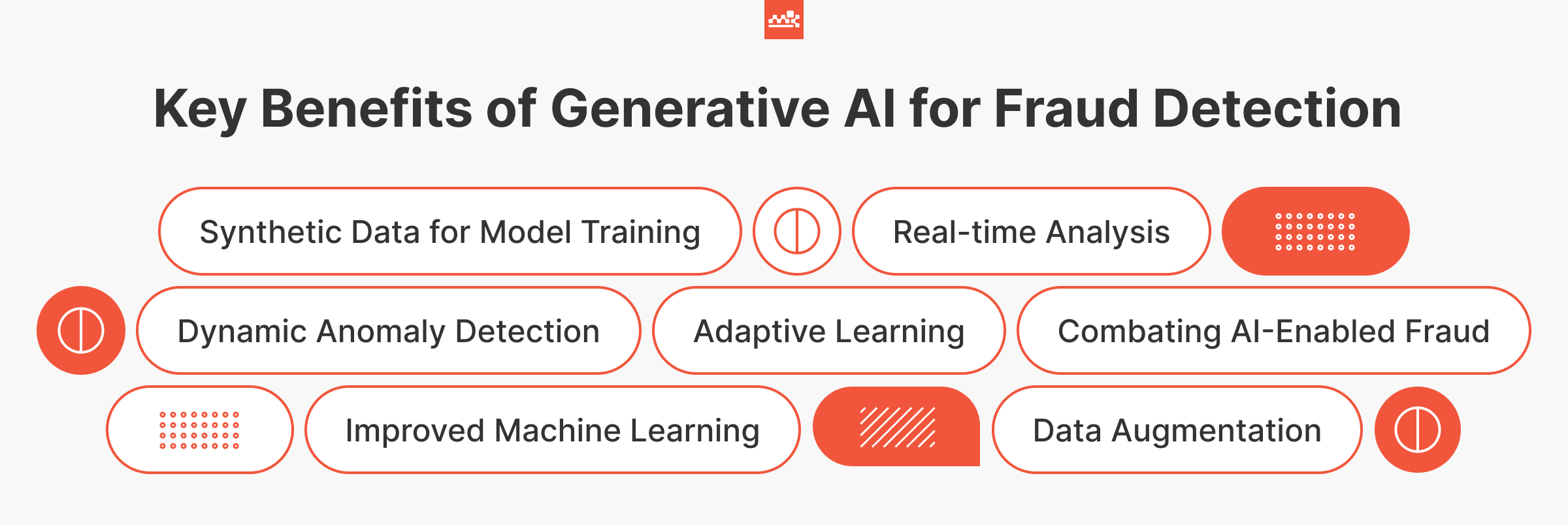
Did you know that consumers reported losing more than $10 billion to fraud in 2023, with even greater losses impacting businesses? Generative AI emerges as a powerful ally, offering multifaceted solutions to this escalating problem. It detects fraudulent activities in real-time, adapts its algorithms to evolving patterns, and augments datasets with synthetically generated transactions to enhance machine learning models. By scrutinizing vast databases for covert schemes, identifying high-risk accounts, and simulating scam scenarios, the technology converts fraud detection strategy from reactive to proactive, safeguarding institutions and their customers.
Effortless Report Generation
Say goodbye to tedious manual reporting. You can now transform raw data into actionable insights with the click of a button. AI-powered applications make this possible, automatically compiling reports, summarizing key findings, and even generating visualizations. This not only saves valuable time but also empowers decision-makers with evidence-backed recommendations. With a 59% increase in document production per hour, the impact is undeniable.
Boosting Employee Performance
Generative AI is more than just automation; it’s about augmenting human capabilities. Studies show the technology can enhance individual performance by up to 40%. It optimizes internal processes, offers personalized training and guidance, and even simplifies IT support through intelligent chatbots. This allows your staff to focus on higher-value activities, driving both productivity and job satisfaction.
Generative AI-Powered Chatbots & Voice Assistants
The technology enables conversational interfaces to engage in natural, contextually relevant dialogues that rival human interactions. This results in a more personalized and efficient customer experience, as such systems can understand complex queries, offer tailored solutions, and even anticipate client needs.
Gen AI allows support agents to focus on escalating cases and increasing sales. It not only elevates satisfaction but also optimizes operational efficiency and reduces costs. With a 94.45% accuracy rate, these generative applications are more accurate than their retrieval-based counterparts (82.51%), ensuring reliable communication.
AI-Augmented Analytics
Generative AI is not just for data scientists – it’s democratizing data analysis for everyone. With intelligent instruments, even non-technical users can easily explore datasets, identify trends, and create insightful reports.
By automating manual processing and providing clear visualizations, the technology empowers your entire team to use data for better decision-making, leading to increased productivity, reduced costs, and improved business outcomes. In fact, evidence-powered organizations are 58% more likely to exceed revenue goals and 162% more likely to outperform profit targets.
AI-Powered Efficiency for Call Centers
By 2026, artificial intelligence is projected to reduce contact center labor costs by $80 billion through streamlined operations. This technology automates routine tasks like handling FAQs, processing orders, and generating post-interaction documentation. Additionally, it empowers agents with real-time guidance, multilingual help, and intelligent call routing.
Through automation of knowledge base development and maintenance, call centers ensure consistent and up-to-date information. Such a thorough approach optimizes expenses and elevates the customer experience with faster, more accurate, and tailored support.
Faster Document Processing
Unstructured information affects 95% of organizations, costing millions annually. Smart applications modernize workflows by automating data extraction, classification, and archiving. These advanced solutions swiftly and accurately manage large volumes of records, cutting down manual labor and errors. This enhances business productivity, ensures regulatory compliance, and improves data accessibility. Efficient document management not only saves time but also streamlines operations, resulting in substantial cost efficiencies.
Enhanced Data Augmentation
Is data scarcity hindering your brand’s ability to innovate and make informed decisions? Generative AI offers a solution by creating synthetic information that supplements existing datasets, filling gaps, and addressing imbalances. This technology is projected to be utilized by 75% of businesses for simulated customer records creation by 2026, up from less than 5% in 2023. It generates realistic and diverse repositories that mimic real-world scenarios, leading to improved model training, strengthened privacy protocols, and more robust decision-making.
Industry-Specific Generative AI Use Cases
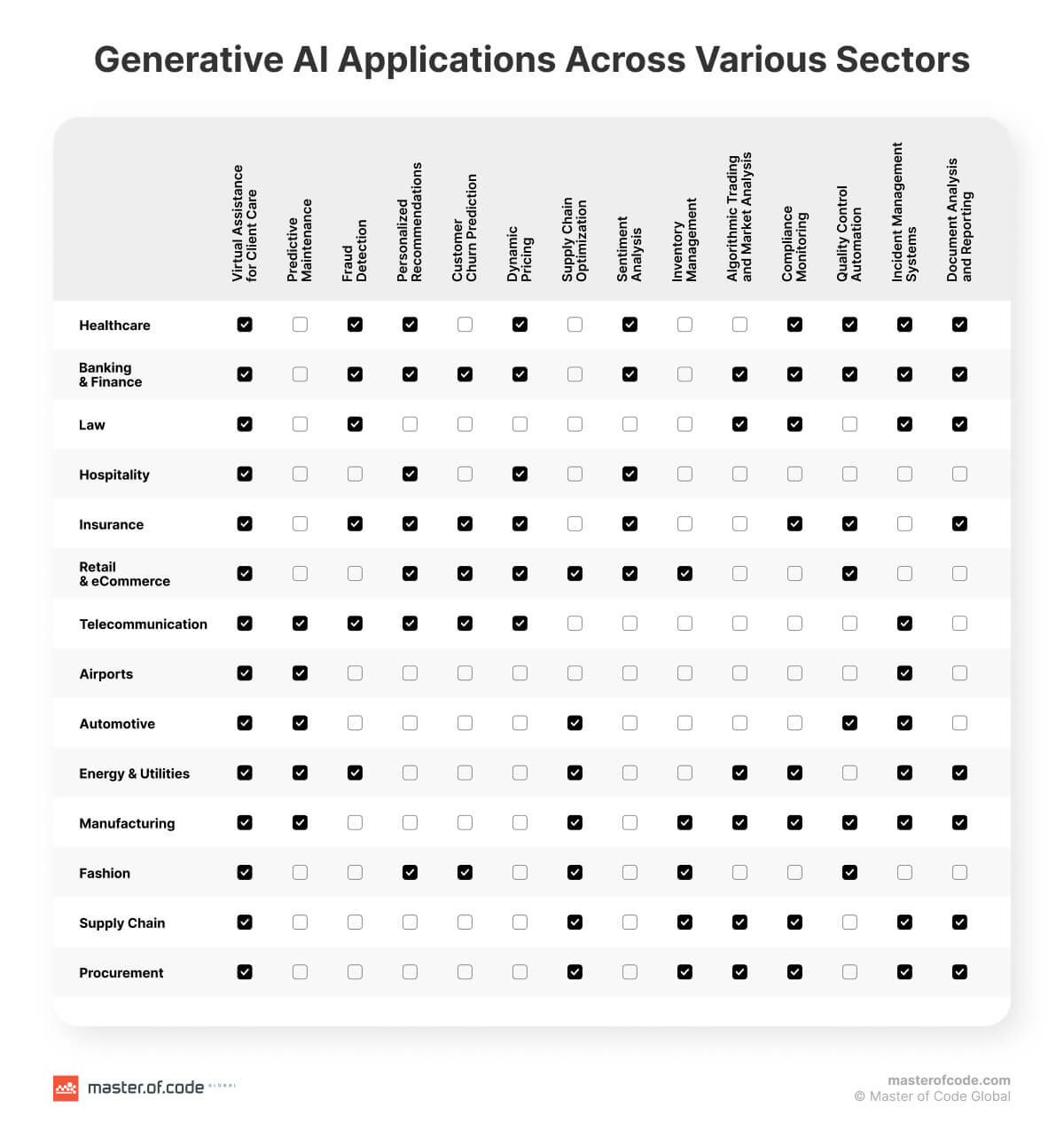
GAI in enterprises is used for tasks such as creating personalized recommendations, generating natural language responses for customer service, automating content creation, predicting user behavior, and enhancing analytics. According to Gartner, by 2026, Generative AI will account for 10% of all data produced, up from less than 1% today.
Healthcare
According to a survey, 75% of health system executives believe that artificial intelligence has the capacity to overhaul the industry. In the upcoming year, the primary applications of Generative AI in medicine are expected to be charge capture and reconciliation (39%), structuring and analyzing patient data (37%), and optimizing workflows through automation (36%). And here’s how the technology is already making a difference.
Medical Image Interpretation
Radiologists are now equipped with an AI-powered second opinion. Self-learning algorithms meticulously analyze medical images, flagging indistinct anomalies and potential indicators of disease that might evade the human eye. This collaboration between clinician’s expertise and AI precision leads to earlier and more accurate diagnoses, ultimately enhancing care outcomes.
Automated Medical Transcription
Healthcare providers spend countless hours on documentation. Now, picture reclaiming that time for actual patient management and treatment. AI models transcribe consultations and notes with remarkable accuracy, reducing administrative burdens and allowing for more focused interactions between doctors and clients.
Personalized Patient Support
Can customer-specific therapy plans boost intervention effectiveness? It can, with Generative AI. Intelligent chatbots and virtual assistants now provide tailored guidance, answering questions, scheduling appointments, and delivering educational resources based on individual needs. This fosters a more engaging and empowering experience.
Streamlined Administrative Workflows
Overwhelmed by manual tasks? Medical organizations are turning to advanced AI solutions to optimize operations like claims processing, appointment booking, and data entry. Such changes not only reduce the risk of human error but also allow staff to dedicate more time to providing high-quality clinical services.
Individualized Treatment Optimization
Every patient is unique, so why should their therapeutic intervention be one-size-fits-all? By scrutinizing patients’ histories, genetics, and lifestyle factors, generative technology creates adapted strategies. With an emphasis on maximizing treatment impact and eliminating side effects, this targeted approach introduces a new phase of evidence-driven precision care.
Examine how global companies are implementing these use cases in practice, setting new benchmarks for the healthcare industry
Pharma
BCG has identified five “golden” use cases for Generative AI in biopharma, including faster drug molecular design, accelerated clinical development, enhanced quality management, more effective content creation, and facilitated review processes. These applications promise to reduce drug R&D timeline by 25%, cut medical writing time by 30%, improve quality control effectiveness by 20-30%, increase revenue by 10%, and boost productivity in review cycles by up to 40%. Now, let’s roll up our sleeves and explore how these possibilities are playing out in the real world. Let’s go further into this.
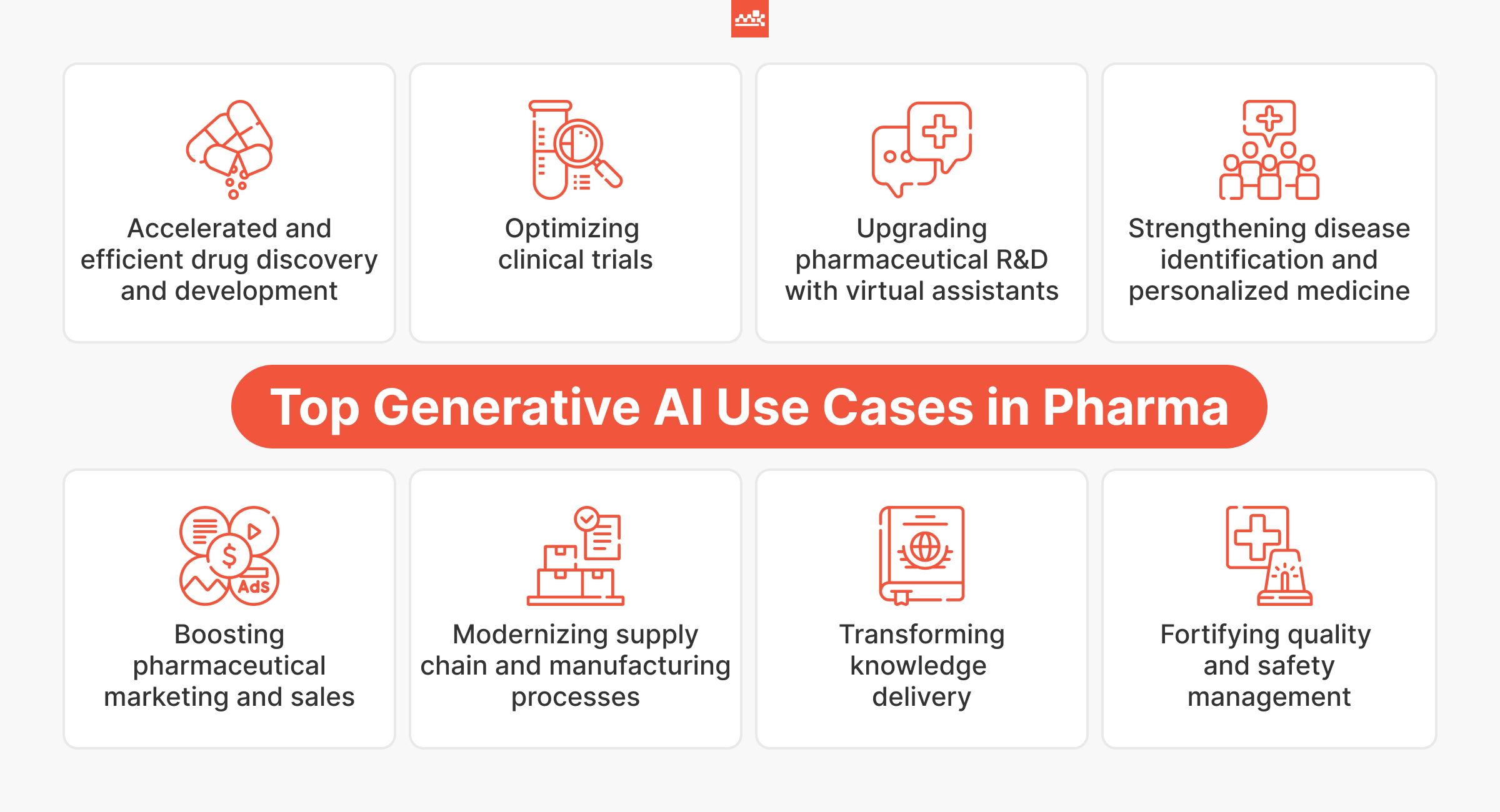
Clinical Trial Optimization
Is your clinical trial bogged down by manual processes and inefficiencies? AI-enabled systems optimize every stage, from protocol design and data collection to real-time monitoring and analysis. By pinpointing conceivable risks and bottlenecks early on, GAI helps mitigate delays and guarantees adherence to regulatory standards.
Computational Drug Discovery
Intelligent algorithms sift through massive datasets of molecular structures and biological activity, generating novel compounds with a higher probability of success. This not only expedites the discovery process but opens doors to groundbreaking treatments for diseases that were once considered incurable.
Targeted Pharma Marketing & Sales Enablement
Personalized medicine calls for adaptable advertising. The technology empowers pharmaceutical companies to craft hyper-tailored campaigns by analyzing profiles and predicting responses to interventions. AI-powered chatbots elevate engagement, interacting with healthcare professionals and patients, offering support and education that drives sales and enhances care outcomes.
Effortless Trial Enrollment
Recruiting patients for trials is often a logjam in drug design. Advanced AI tools dismantle this barrier, automating the screening of individual records, identifying suitable participants, and crafting unique messages. Such an approach accelerates signup and ensures a diverse patient population, leading to more robust and meaningful trial results.
Review 7 other influential use cases in the pharma industry to see if they can help solve your firm’s existing challenges
Finance
MIT Technology Review projects Generative AI can save the financial services industry up to $340 billion annually. Early adopters are already seeing an 18% boost in customer satisfaction, productivity, and market share, with an average $3.50 return for every $1 invested. The possibilities are endless. Let’s take a tour of some of the most innovative ways GAI is being deployed today.

Personalizing Customer Experiences
Client demands are growing, with customized digital journeys and tailored offers becoming the norm. Intelligent applications analyze user data, generating unique investment portfolios and financial product recommendations. Conversational interfaces engage in natural language, understanding complex queries and providing 24/7 support. This boosts consumer satisfaction, fosters loyalty, and gives institutions a competitive edge.
Intelligent Financial Documentation
Reporting is usually a laborious task, fraught with the possibility of mistakes. Smart solutions automate the creation of transparent documents, performing complex calculations and summarizing key findings. They liberate financial analysts from tedious work, allowing them to focus on strategic estimation and decision-making. The result? Increased accuracy, faster turnaround times, and a more agile approach to financial reporting.
Insights for Portfolio Management
Traditional investment strategies can be limited by reliance on historical records. Enter AI tools, which examine vast amounts of market data, including alternative sources like news and social sentiment. This helps identify emerging trends and potential trading signals often overlooked by conventional methods. Brands get a dynamic, adaptable strategy for portfolio management that aligns with buyer goals and maximizes returns in a fluctuating sector.
Error-Free Transactions
Payment processing is the backbone of monetary operations. Enterprises can rely on AI-driven automation to optimize invoice handling, reconciliation, and payment routing, minimizing errors and ensuring seamless transactions. The technology reduces processing times and costs and enhances cash flow oversight. By eliminating manual bottlenecks and streamlining procedures, AI applications pave the way for a more efficient and profitable ecosystem.
Accelerating Product Launches
Is your financial institution struggling to keep up with the rapid pace of innovation? Generative AI is a catalyst for developing new offerings and services adjusted to evolving customer needs. By analyzing market trends, client feedback, and competitors, predictive algorithms generate creative ideas and even prototype new financial instruments. The benefits are an accelerated product development cycle and alignment with market demand.
Find out how Generative AI can overcome 10 major operational and strategic hurdles in the finance industry
Banking
Did you know that 77% of banking executives believe artificial intelligence is crucial for success, with over half already actively integrating it? The ultimate breakthrough: Generative AI is projected to slash costs by 9% and boost sales by 9% within three years. Imagine what this could mean for your bank’s bottom line. The proof is evident in the use cases we will discuss.
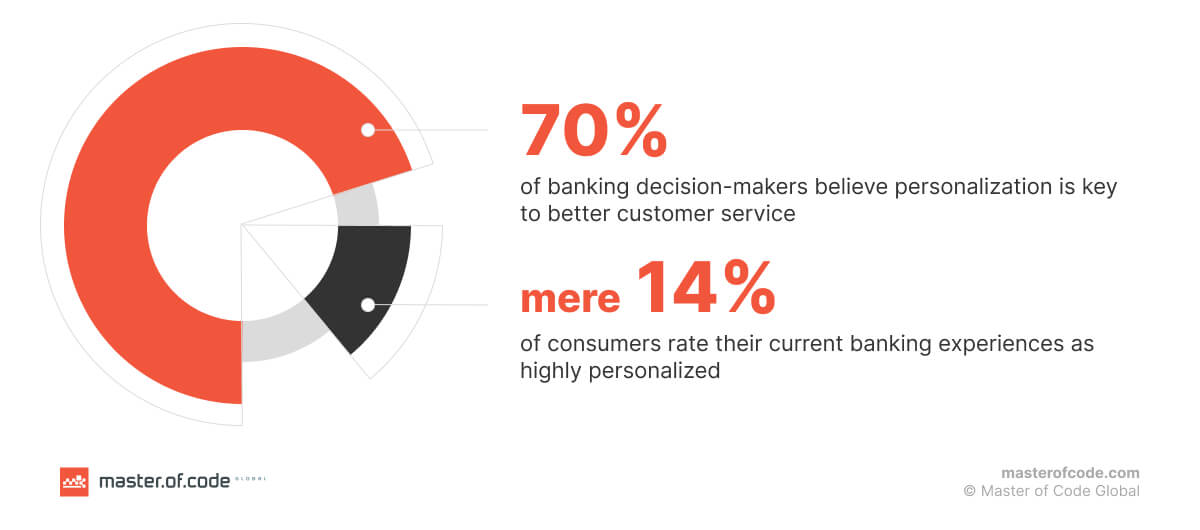
Credit Score Questions
Wondering about your financial health? An intelligent FAQ chatbot instantly answers inquiries about credit scores and offers tailored recommendations for improvement. By analyzing your income, employment, and history, generative algorithms can provide a personalized assessment, empowering you to make informed decisions.
Financial Literacy
Navigating the banking world can be daunting. Generative conversational systems simplify complex concepts, providing clear explanations and guidance in multiple languages. This empowers customers to gain knowledge and select financial products wisely, fostering trust and confidence in their judgments.
Fraud Detection and Prevention
Protecting your finances is paramount. The technology acts as a vigilant guardian, tirelessly analyzing transactions and user actions to detect fraudulent activity in real-time. By scrutinizing behavioral biometrics, monitoring account changes, and uncovering anomalies in vast datasets, AI shields your financial assets from sophisticated threats.
Discover how competitors such as Wells Fargo, Morgan Stanley, JPMorgan Chase, Citigroup, Mastercard, and others are setting the new standard with Generative AI
Law
Interestingly, 43% of surveyed lawyers see AI as an opportunity, primarily for automating routine tasks. Goldman Sachs predicts it could handle 44% of current legal work, opening the door for greater efficiency and cost savings. But enough theory, let’s focus on how this technology is actively transforming the industry today.
AI-Based Legal Chatbots
Is your law firm ready for the future of client interaction? Digital agents powered by LLM are altering the support landscape, automating initial inquiries, and providing instant responses to basic questions. This enhances user experience, simplifies case triaging, and frees up valuable time for legal professionals to focus on litigation strategy, consumer counseling, and negotiation tactics. With 80% of organizations predicting increased customer self-service, these intelligent assistants are a necessity, not a luxury.
Legal Advice Generation
Accelerate legal insights with Generative AI. This cutting-edge technology swiftly analyzes vast amounts of case law and statutes, offering guidance on legal matters, such as contract disputes, liability claims, or intellectual property issues. Clients get quick answers to common queries, while attorneys are able to dedicate their expertise to more nuanced and complex cases, maximizing productivity and delivering superior service.
Document Review and Analysis
Sifting through mountains of documents is a thing of the past. AI-amplified applications scan and analyze tremendous volumes of text, pinpointing relevant information and key clauses with unmatched precision. The advantages are a streamlined document review process, reduced manual effort, and accurate examination, which ultimately saves time and resources while mitigating the risk of oversight.
Still uncertain about the benefits of Generative AI for the legal sector? Read the overview from our CEO, Dima Gritsenko, to gain more insights
Hospitality
According to LTIMindtree, 79% of hospitality professionals are adopting Generative AI to enhance the guest experience, while 48% are using it for creative content generation. For 67% it helps to optimize processes, resulting in a 20-40% boost in operational effectiveness and a 5-20% increase in revenue. Eager to see the magic in action? Here’s a breakdown of the most impactful use cases.
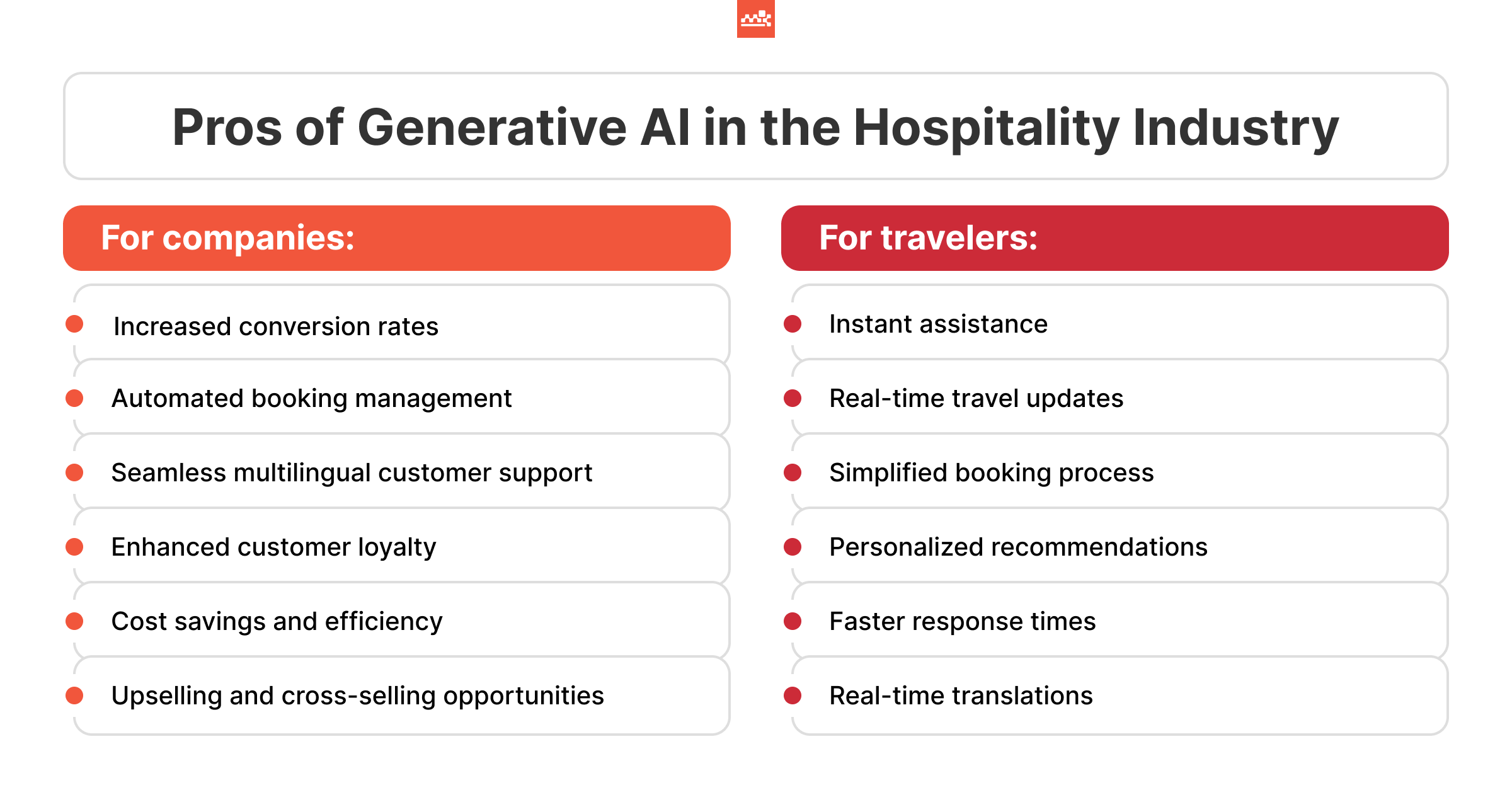
AI Endorser
Forge a deeper connection with your target audience. AI-powered brand ambassadors, meticulously crafted to personify your hotel or resort’s distinctive qualities, offer bespoke interactions that align with diverse customer segments. These digital representatives elevate your brand image and create unique, memorable experiences that drive engagement and loyalty.
Language Translation
Say goodbye to communication challenges. AI tools empower your staff to communicate effortlessly with international guests. They can instantly translate menus, brochures, and even real-time conversations, ensuring a welcoming and inclusive atmosphere for all visitors, eliminating language barriers, and enhancing satisfaction.
Personalized Travel Suggestions
Move beyond generic recommendations and embrace hyper-personalization. Generative AI chatbot analyzes clients’ preferences, past bookings, and contextual data to curate individual itineraries and experiences. By offering custom-tailored tips, from hidden local gems to customized dining options, AI ensures each guest feels valued and understood, turning their stay into an unforgettable adventure.
For a more detailed overview of use cases and examples in the travel industry, check our tutorial
Insurance
Sprout.ai’s findings indicate that 59% of insurance companies have embraced generative technology, achieving gains like staff efficiency (61%), improved customer service (48%), cost savings (56%), and growth (48%). But how exactly is it being used? Let’s explore some of the most profitable use cases across the sector.
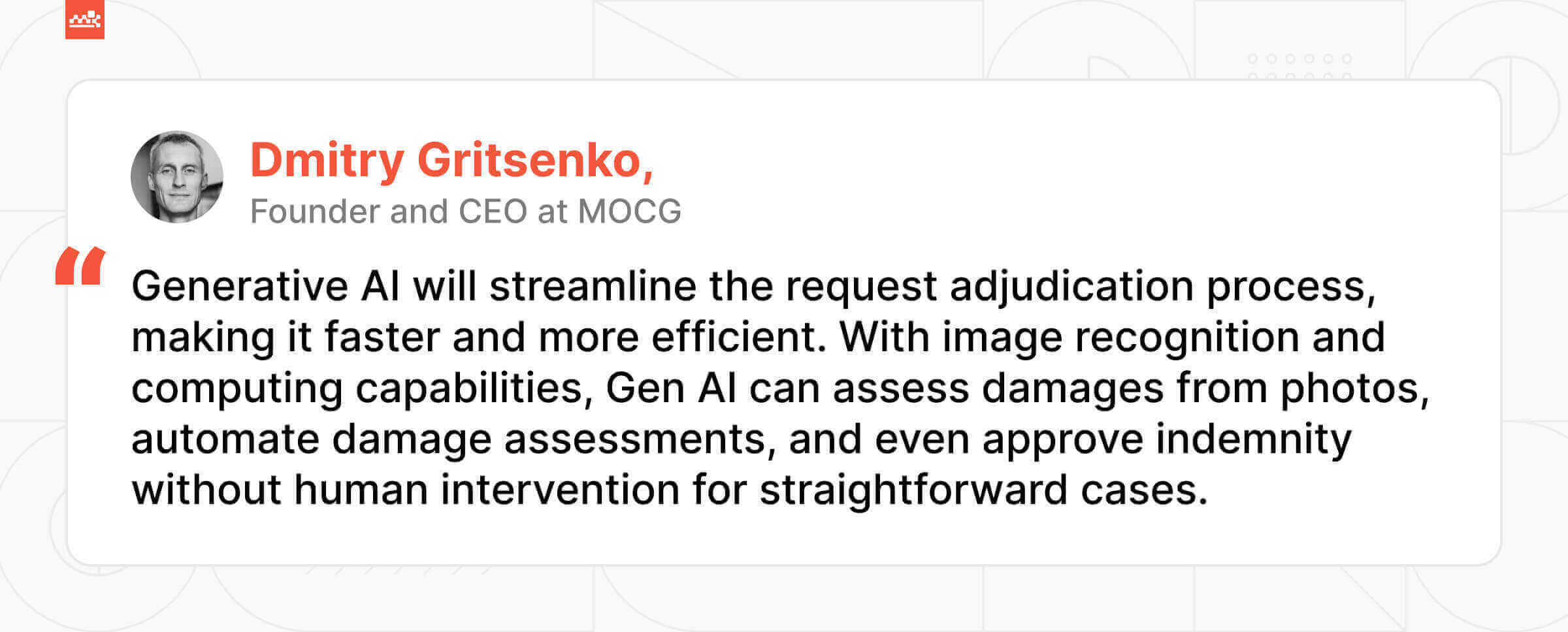
Automated Underwriting
Gen AI redefines insurance underwriting, going beyond basic demographics to scrutinize vast datasets, including personal health records and financial backgrounds. This enables insurers to create detailed risk assessments and tailor policies to each applicant’s unique profile, ensuring fairness and accuracy while mitigating threats.
Effective Claims Management
Say goodbye to lengthy submission processing. AI-enabled algorithms expedite settlements by swiftly analyzing prospects’ data and identifying behaviors indicative of legitimate or fraudulent claims. It enhances client care by providing real-time updates, clarifying queries, and proactively addressing concerns, ultimately improving satisfaction.
Risk Assessment and Quotes
Forget one-size-fits-all premiums. The AI model assesses complex patterns in activities and lifestyles, creating a sophisticated risk profile for each individual. This leads to more accurate and equitable pricing, benefiting both customers and insurers. Low-risk individuals are rewarded with better rates, while loss-prone clients are identified and managed appropriately.
Four insurance companies are already reaping the benefits. Want to know how? Check out our article.
Retail
Recent research shows that 60% of customers think artificial intelligence can reshape support services. They’re onto something: 74.7% of consumers are more likely to make repeat purchases from personalized brands. Let’s explore three major Generative AI business use cases transforming the retail experience.
Personalized Recommendations
A curated journey is what shoppers crave, and Gen AI interfaces can fulfill this need. Exploring user data fuels individualized marketing and product suggestions that genuinely appeal to customers. This evidence-fueled approach fosters loyalty and facilitates conversions, guaranteeing that promotion efforts are not only efficient but also highly effective.
Virtual Try-Ons
Picture yourself testing out clothes or makeup without stepping foot in a store. AI tools make it possible with virtual try-on experiences, eliminating the guesswork from online shopping. Such an interactive strategy boosts buyer confidence, reduces returns, and elevates the overall buying process.
Optimized Pricing
Dynamic pricing tactics driven by generative algorithms can respond to real-time market conditions, ensuring optimal price points that maximize profits. AI models go further, analyzing customer behavior and preferences to offer tailored discounts and incentives that appeal to each person, creating a sense of value and encouraging returning clients.
Check out our blog post to discover how 4 major retailers are using Generative AI to improve their operations.
eCommerce
How can online merchants benefit from technology integration? McKinsey’s research highlights a significant 10-15% increase in consumer retention through AI-based bespoke outreach. “Live search” and “automated product recommendations” emerge as the top features, favored by 42% and 35.7% of respondents, respectively. Let’s now explore some of the most impactful Generative AI enterprise use cases in this sector.
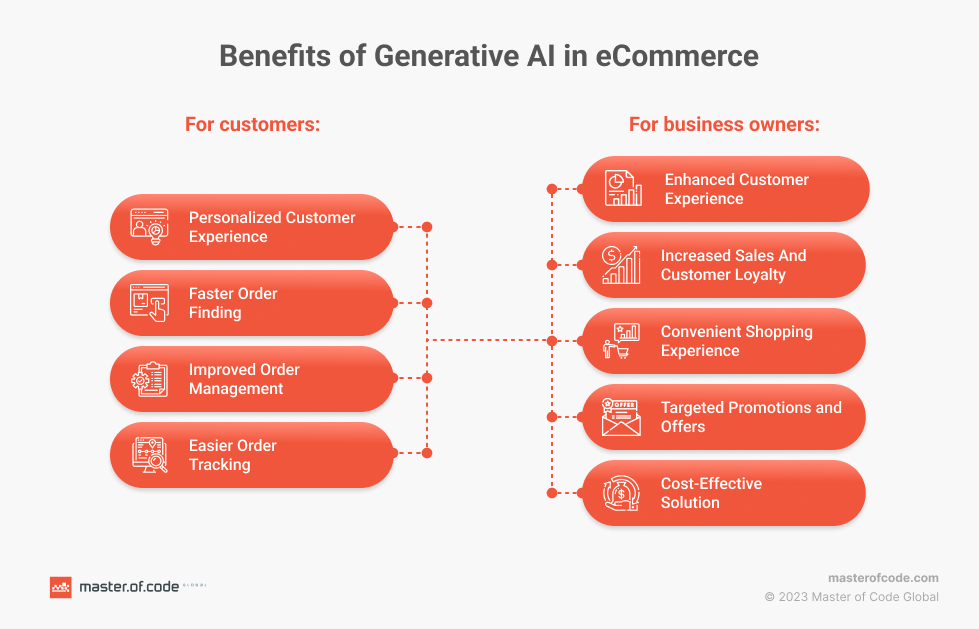
AI-Powered Conversational Commerce
GAI is transforming online trade through interactive dialogue. This technology merges chat functionality with messaging to create a fluid and engaging purchasing journey, providing real-time assistance and tailored guidance. By converting transactions into meaningful exchanges, it cultivates robust customer bonds and enhances brand loyalty.
AI Personal Shoppers
Exploring the vast digital marketplace can be daunting. Virtual assistants serve as the ideal solution, steering clients through the buying process with customized offers. These AI-enabled guides analyze preferences and past purchases to help users pinpoint desired items and uncover exciting new products, ensuring each browsing session becomes a unique adventure.
Upselling/Cross-selling
Gen AI also elevates product suggestions to unprecedented heights. Smart systems examine order patterns and consumer behaviors, proposing complementary things or upgrades in an organic, conversational manner. This method not only enriches the shopping experience but also boosts revenue by showcasing relevant merchandise at opportune moments.
Reducing Cart Abandonment
Tackle unfinished purchases with AI-driven tactics. Intelligent algorithms study browsing habits, forecast possible drop-offs, and craft individualized interventions to re-engage hesitant buyers. From curated recommendations to strategic discounts and helpful chatbots, this technology aids businesses in reclaiming lost opportunities and improving conversion rates.
Raise Retention Rate
Automated solutions facilitate a holistic strategy for maintaining a loyal buyer base, caring for customers from start to finish. It streamlines personalized marketing efforts, refines product advice, and anticipates potential churn to proactively address concerns. This approach fosters enduring connections and transforms satisfied shoppers into passionate brand advocates.
Not finding these use cases relevant to your challenges? Check out other top Generative AI use cases in the eCommerce market to see how your business can capitalize on the technology.
Telecommunication
A joint study by Altman Solon and AWS reveals that high-impact Generative AI enterprise use cases in the telecom sector are being embraced by firms aiming for enhanced productivity (41%), expense reduction (20%), and market edge (18%). Let’s take a closer look at these applications in detail.
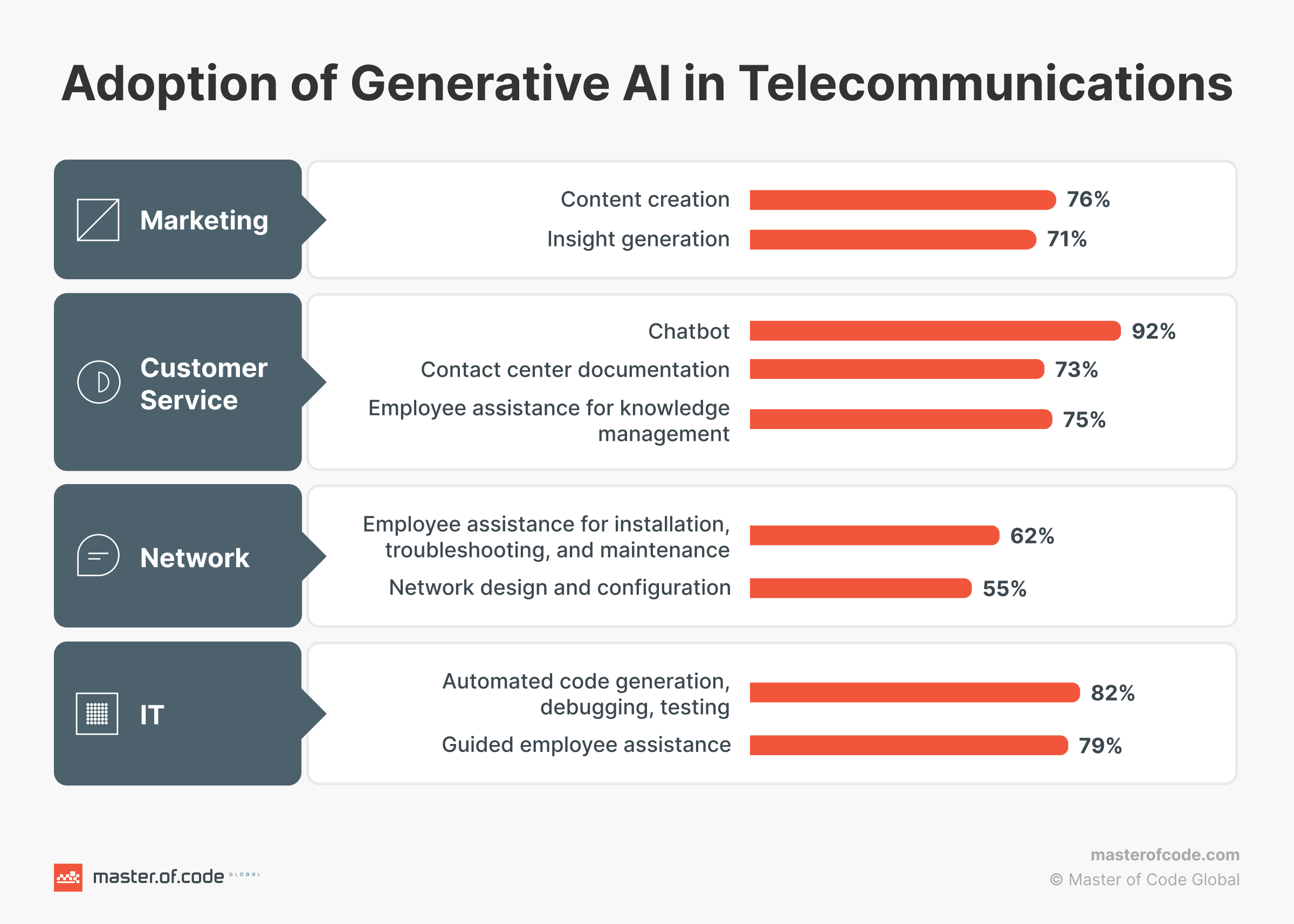
Individualized Product Suggestions
The technology enables providers to transcend standardized plans. By examining subscriber usage trends and preferences, intelligent algorithms craft bespoke plan recommendations, containing data allowances, supplementary features, and even device upgrades. This tailored strategy enhances client satisfaction and boosts the prospects of upselling and contract extensions.
Billing Inquiries
Bid farewell to exasperating invoice confusion. Generative interfaces equip telecom firms to provide lucid, succinct, and individualized responses to billing questions. It scrutinizes statements, pinpoints cost factors, and proposes customized money-saving tactics. The system also detects accounting discrepancies and recommends remedial actions, nurturing openness and credibility.
Promotion Summary
Businesses can also rely on AI tools to break through the clutter of generic offers. These models examine user profiles to deliver targeted promotional overviews, ensuring relevance and maximizing engagement. By aligning deals with individual interests, telco companies heighten conversion rates and cultivate customer loyalty.
Monitoring and Management of Network Operations
Generative AI serves as the vigilant overseer of your infrastructure, assessing real-time data to guarantee optimal performance and proactive upkeep. It recognizes irregularities, anticipates potential issues before they escalate, and automates routine procedures, resulting in improved network dependability and minimized disruptions.
Investigate additional strategic use cases and their advantages to better comprehend market trends and customer needs
Airports
PWC’s report reveals a significant 33% disparity between traveler expectations and actual experiences in the airline industry. AI models present a promising solution to narrow this gap, offering a more tailored and streamlined journey. Let’s take a closer look at its practical applications.
Wayfinding & Navigation
Confused in a labyrinth of terminals? Not anymore. Intelligent chatbots provide travelers with precise, up-to-the-minute directions, adjusting for gate reassignments or unexpected closures. Interactive digital maps and landmarks displayed on mobile devices further enhance orientation, ensuring passengers reach their destinations without stress.
Flight Information and Assistance
83% of airline clients anticipate responses within 24 hours (Accenture). Advanced AI-powered systems surpass these demands, delivering instant, accurate updates on flight schedules, delays, gate changes, and luggage details. Such rapid communication reduces traveler anxiety and boosts overall satisfaction.
Booking and Reservation
Hassle-free reservations are now a reality. Smart digital assistants simplify the process, guiding users through flight selections, seat preferences, and even airport service arrangements. By comprehending individual needs, these AI tools suggest customized options, crafting a smooth and personalized experience.
Looking to maximize the benefits of the new technology? Read our in-depth review of its applications for the airport industry
Automotive
AI models are steering the future of the auto industry as well. McKinsey reports that its implementation could accelerate automobile part development by 10-20%. This powerful technology is also enhancing efficiency, innovation, personalization, and the overall consumer experience. Here are 3 real-world examples of how businesses are using Generative AI to their advantage.

Gen AI-Powered Chatbot
Say goodbye to generic customer interactions. LLM-infused chatbots offer tailored experiences, guiding users through model selection, answering complex queries, and providing timely check-up reminders. They also empower businesses to identify upsell and cross-sell opportunities, boosting sales and forging long-term relationships with buyers.
Predictive Maintenance
No more unexpected breakdowns. Generative systems use data on mileage and driving habits to predict when parts might fail, enabling proactive upkeep and preventing costly repairs. This leads to happier customers, fewer warranty claims, and optimized fleet management for auto enterprises.
In-Car Assistants
Hands-free control and personalized assistance are now at your fingertips (or rather, your voice). AI-fueled virtual assistants allow drivers to navigate, play music, and even send messages without taking their eyes off the road. This not only enhances safety but also opens doors to new in-car services and revenue streams for automotive companies.
Toyota, CarMax, and BMW have already adopted Gen AI technology – find out how in our article
Energy and Utilities
Over a third of energy and utility firms are actively using artificial intelligence, motivated by its capacity to elevate user satisfaction, streamline operations, and boost productivity by 20-40%. Let’s examine some specific enterprise use cases for Generative AI in this sector.
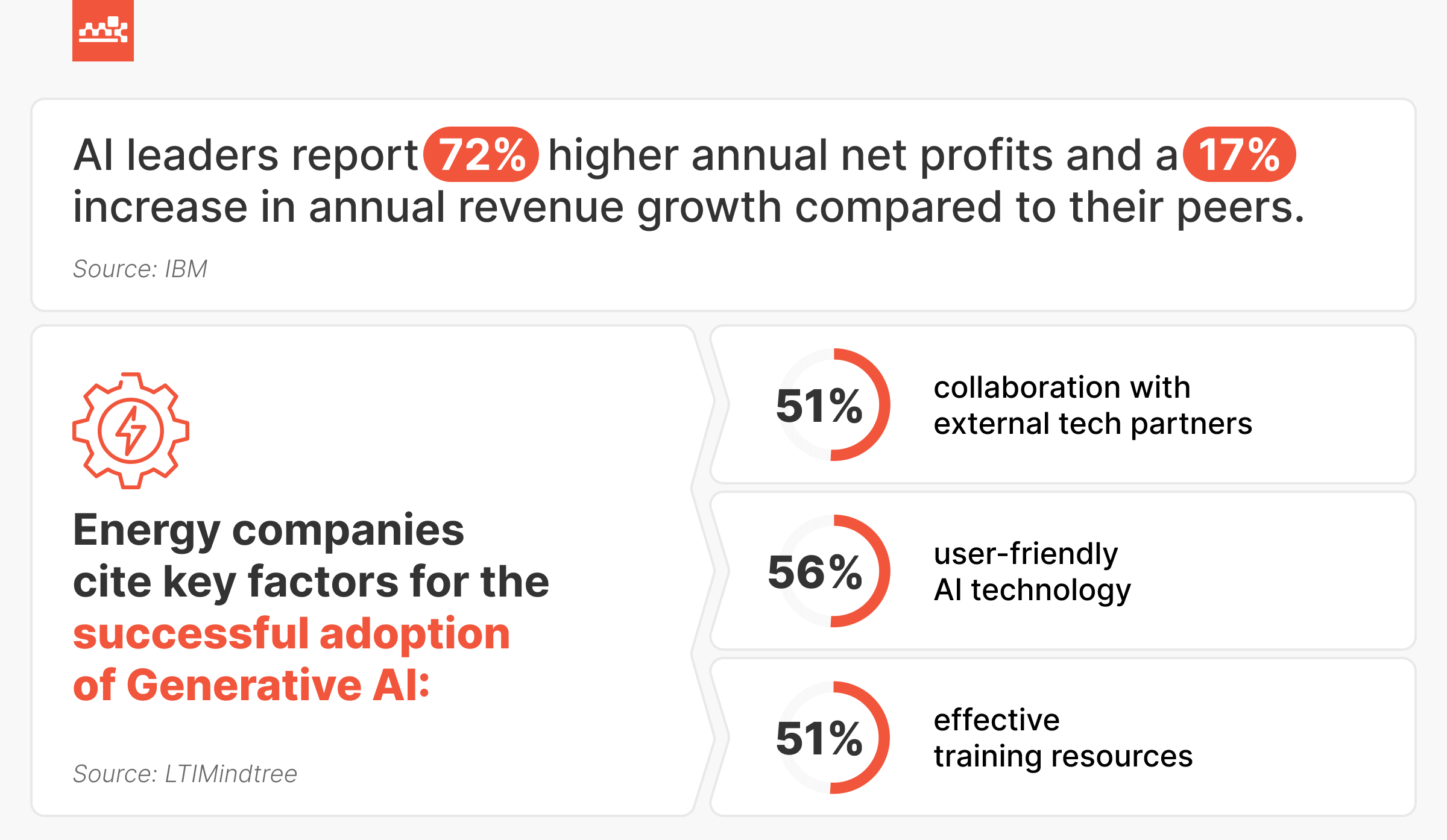
Automation of Routine Tasks
Intelligent solutions handle mundane, repetitive operations such as bill creation, transaction processing, and client account administration. This shift enables staff to concentrate on strategic initiatives, enhances precision, and expedites workflows.
Carbon Footprint Reduction
43% of industry leaders are exploring the technology for ecological monitoring and control. These systems analyze emissions data and support decision-making for green practices. By utilizing AI-driven insights, organizations can minimize their environmental impact, adhere to regulations, and contribute to a greener future.
Renewable Energy Management and Forecasting
With 54% of executives considering its implementation, GAI is set to transform renewable resource oversight. It optimizes power storage, anticipates demand fluctuations, and facilitates seamless integration of sustainable sources into the grid, ensuring a reliable and eco-friendly supply.
Uncover more existing applications of Generative AI in the energy industry for an in-depth look at its possibilities
Supply Chain Management
The logistics sector is experiencing a significant transformation due to generative technology. The market for this innovation is set for remarkable expansion, projecting a CAGR of 45.62% from 2023 to 2032. Curious how the models are being applied in practice? Let’s dig deeper into it.
Demand Forecasting
Weary of unpredictable market fluctuations impacting your profits? Advanced algorithms allow you to anticipate trends with unparalleled precision. These systems examine historical data, industry patterns, and external influences to predict future consumption directions, empowering firms to fine-tune stock levels, minimize shortages, and boost overall operational efficiency.
Supply Chain Planning
Effortlessly coordinate your logistics network with AI-driven strategies. By considering production capacity, delivery times, and demand projections, intelligent applications optimize your entire distribution framework. This approach reduces bottlenecks, minimizes delays, and enhances productivity, ensuring a fluid movement of goods from manufacturers to end-users.
Inventory Optimization
Bid farewell to excess stock and product scarcity. Smart technologies help you achieve the ideal equilibrium in commodities control. By calculating optimal inventory levels and identifying the most effective allocation tactics, companies can lower storage expenses, improve adaptability, and ensure item availability at the right time and location for consumers.
Gain more insights into the supply chain use cases from Ivan Pohrebniyak, our Chief Delivery Officer
Procurement
As the cornerstone of manufacturing and supply chain operations, procurement is also spearheading the adoption of Generative AI. This segment constitutes a substantial 37.6% of the total market revenue, underscoring its strategic significance. Here’s precisely how the technology is shaping the landscape.

Document Creation
Fatigued by manually composing purchase orders, contracts, and supplier agreements? Advanced algorithms automate the generation of these crucial documents, guaranteeing precision, uniformity, and regulatory compliance. The technology conserves time and minimizes errors, enabling specialists to concentrate on strategic sourcing and vendor relationship management.
Decision Support
Making well-informed purchasing choices can be intricate. Intelligent systems empower teams by examining vast datasets, including performance, market dynamics, and risk elements. This yields valuable insights that guide vendor selection and contract negotiations, ultimately resulting in cost reductions and enhanced operational effectiveness.
Virtual Assistance
Seeking guidance through complex buying processes or locating suitable suppliers? AI-driven digital aides offer round-the-clock help, addressing inquiries, providing direction, and even automating routine tasks like order tracking and invoice reconciliation. Assistants streamline procurement procedures, boost productivity, and elevate the overall user experience.
Manufacturing
The global market value for Generative AI in this sector is projected to reach approximately USD 6,398.8 million by 2032. Early implementers of such systems are set to gain a considerable competitive advantage. Let’s explore five of the most valuable Generative AI enterprise use cases.
Maintenance
Preventative care, not reactive repairs. Advanced algorithms analyze machinery data, forecasting potential failures before they disrupt production. This proactive strategy minimizes downtime, optimizes upkeep schedules, and extends equipment longevity, yielding significant cost reductions.
Product Design Optimization
From concept to reality, faster and smarter. Intelligent tools assist in crafting innovative and refined products by exploring myriad design possibilities, simulating performance under various conditions, and identifying possible flaws early in development. This accelerates launch, reduces costs, and results in goods that meet or surpass customer expectations.
Equipment Diagnostics
Eliminate guesswork in troubleshooting. Cutting-edge technology examines real-time information from sensors, detecting abnormalities and conceivable issues before they escalate into costly breakdowns. Swift diagnosis and targeted interventions guarantee smooth manufacturing flow.
Detect Supply Chain Anomalies
Unforeseen disruptions can trigger a domino effect on output. Smart systems constantly monitor logistics data, flagging irregularities and risks such as delays, shortages, or quality concerns. This enables proactive mitigation strategies, ensuring stability and minimizing functional impact.
Operational Efficiency
AI serves as a virtual productivity consultant. It scrutinizes available information to pinpoint bottlenecks, inefficiencies, and opportunities for enhancement. Eventually, manufacturers streamline processes, minimize waste, and maximize output, leading to substantial savings and improved competitiveness.
For an extensive overview, look into Generative AI in Manufacturing: Success Stories That Inspire to Deploy Innovative Solutions
Fashion
Artificial intelligence is making waves in the fashion world, with executives recognizing its potential to reshape marketing (60%), digital shopping experience (25%), and logistics (13%). Let’s explore these Generative AI enterprise use cases in detail.
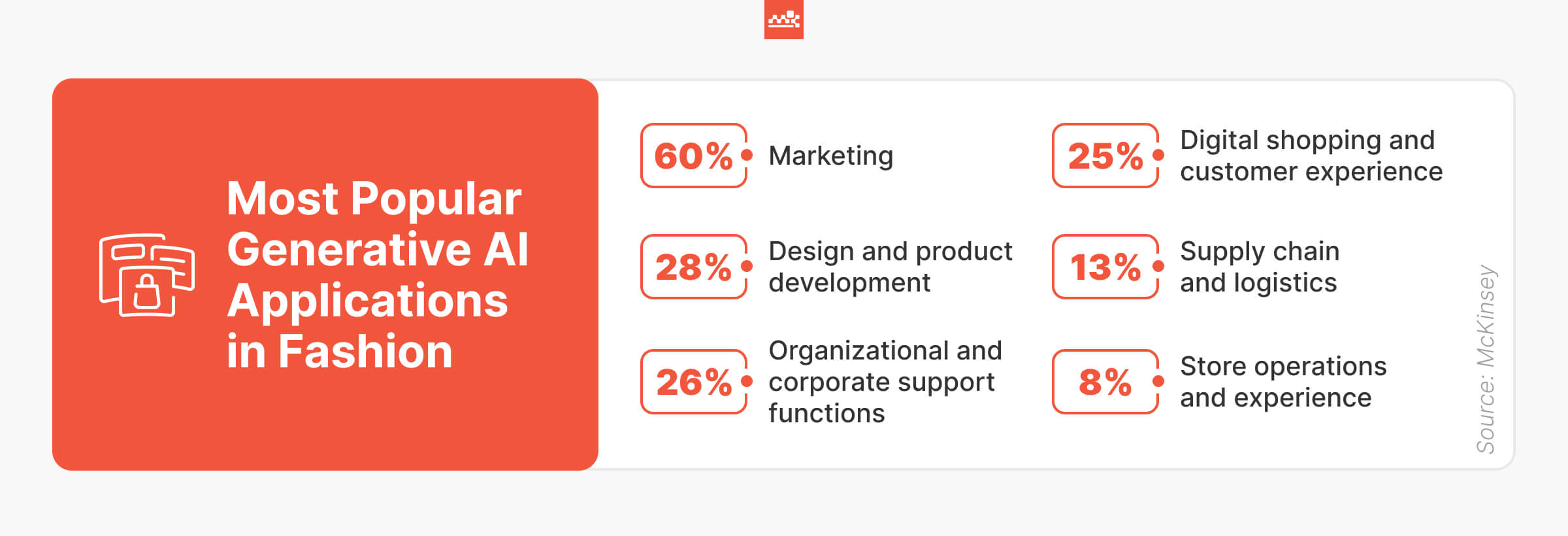
Customized Shopping Experience
Forget generic commerce; smart technology offers a tailored retail journey for each client. Through data-driven insights, it curates product suggestions, styling advice, and even virtual fittings to individual tastes. The outcome? Boosted revenue, enhanced ROI, and a more captivating and gratifying buyer experience.
Marketing and Trend Prediction
In a swiftly evolving sector, predicting trends is crucial. Intelligent systems analyze vast datasets to forecast upcoming styles and gauge consumer sentiments, enabling brands to craft targeted campaigns that strike a chord. This translates to heightened engagement, increased sales, and a fortified brand image.
Optimized Inventory Management and Logistics
The apparel industry is known for its dynamic and often unpredictable demand. AI applications help navigate this complexity by refining stock control and distribution. From anticipating fluctuations to streamlining warehouse operations and tailoring return policies, these innovations empower businesses to boost efficiency, minimize waste, and ensure a fluid supply chain.
Uncover other use cases to see how your fashion brand can elevate sales and improve customer satisfaction
In the End …
The conceivable return on investment from Generative AI use cases discussed is undeniable. From cost savings and increased efficiency to enhanced customer satisfaction and revenue growth, the benefits are far-reaching. Whether you’re in healthcare, finance, or any other industry, GAI offers a wealth of opportunities to optimize your operations and achieve your objectives.
At Master of Code Global, we specialize in facilitating frictionless Gen AI integration, empowering businesses to squeeze every drop of potential from this powerful technology. Our team of experienced developers can tailor solutions to meet your specific needs, unlocking new possibilities for your brand.
Take the next step towards a smarter, more efficient future. Hire our Generative AI engineers and position your company at the forefront of technological advancement.
Ready to build your own Conversational AI solution? Let’s chat!






